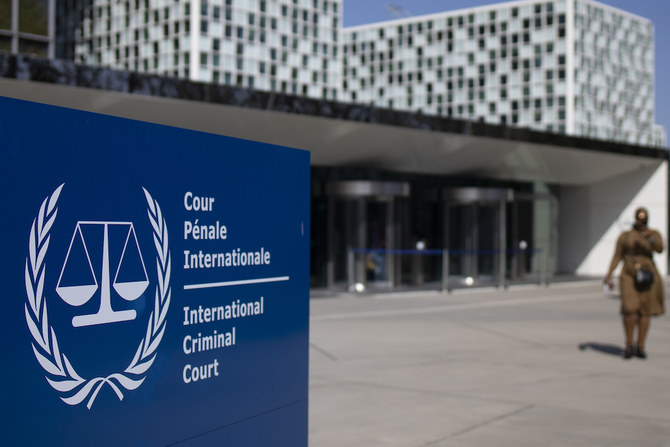LONDON: South Africa launched a case Friday at the United Nations’ top court accusing Israel of genocide against Palestinians in Gaza and asking the court to order Israel to halt its attacks.
South Africa’s submission to the International Court of Justice alleges that “acts and omissions by Israel ... are genocidal in character” as they are committed with the intent “to destroy Palestinians in Gaza” as a part of the broader Palestinian national, racial and ethnic group.
South Africa has been a fierce critic of Israel’s military campaign in Gaza. Many there including President Cyril Ramaphosa have compared Israel’s policies regarding Palestinians in Gaza and the West Bank with South Africa’s past apartheid regime of racial segregation.
South Africa asked the Hague-based court to issue an interim order for Israel to immediately suspend its military operations in Gaza. A hearing into that request is likely in the coming days or weeks. The case, if it goes ahead, will take years, but an interim order could be issued within weeks.
South Africa’s filing alleged Israel was violating its obligations under the treaty, drafted in the wake of the Holocaust, which makes it a crime to attempt to destroy a people in whole or in part.
It asked the court to issue provisional, or short-term, measures ordering Israel to stop its military campaign in Gaza, which it said were “necessary in this case to protect against further, severe and irreparable harm to the rights of the Palestinian people.”
No date has been set for a hearing.
While the ICJ in The Hague is considered the UN’s highest court, its rulings are sometimes ignored. In March 2022, the court ordered Russia to halt hostilities in Ukraine, a binding legal ruling that Moscow flouted as it pressed ahead with its attacks.
Israel’s foreign ministry on Friday said it “rejects with disgust” the case launched by South Africa.
“Israel rejects with disgust the blood libel spread by South Africa and its application” to the ICJ, Israeli foreign ministry spokesman Lior Haiat wrote on X, formerly Twitter.
“South Africa’s claim lacks both a factual and a legal basis, and constitutes despicable and contemptuous exploitation of the court.”
Lashing out at South Africa, Haiat accused the country of “cooperating with a terrorist organization,” referring to the Hamas movement.
The statement also said Israel operates according to international law and focuses its military actions solely against Hamas, adding that the residents of Gaza are not an enemy. It asserted that it takes steps to minimize harm to civilians and to allow humanitarian aid to enter the territory.
South Africa can bring the case under the Genocide Convention because both it and Israel are signatories to it.
Whether the case will succeed in halting the war remains to be seen. While the court’s orders are legally binding, they are not always followed.
South Africa’s foreign ministry said in a statement that the country is “gravely concerned with the plight of civilians caught in the present Israeli attacks on the Gaza Strip due to the indiscriminate use of force and forcible removal of inhabitants.”
The ministry added that there are “ongoing reports of international crimes, such as crimes against humanity and war crimes, being committed as well as reports that acts meeting the threshold of genocide or related crimes as defined in the 1948 Convention on the Prevention and Punishment of Genocide, have been and may still be committed in the context of the ongoing massacres in Gaza.”
War began on Oct. 7 when militants of the Islamist group Hamas killed 1,200 people in a cross-border attack and seized 240 hostages by Israel’s count. Israel responded with an assault on Hamas-ruled Gaza, killing more than 21,000 people, Palestinian health officials say.
“Israel, since 7 October 2023 in particular, has failed to prevent genocide and has failed to prosecute the direct and public incitement to genocide,” South Africa’s Department of International Relations and Cooperation said in a statement.
South Africa’s president earlier accused Israel of war crimes and acts “tantamount to genocide.” And South Africa last month pushed for the International Criminal Court, which also is based in The Hague, to investigate Israel’s actions in Gaza.
The ICC prosecutes individuals for war crimes, crimes against humanity and genocide, while the International Court of Justice settles disputes between nations.
Balkees Jarrah, associate international justice director at Human Rights Watch, said South Africa’s case “provides an important opportunity for the International Court of Justice to scrutinize Israel’s actions in Gaza using the Genocide Convention of 1948.” She said South Africa is looking to the United Nations’ highest judicial body “to provide clear, definitive answers on the question of whether Israel is committing genocide against the Palestinian people.”
Jarrah stressed that the ICJ case “is not a criminal case against individual alleged perpetrators, and it does not involve the International Criminal Court (ICC), a separate body. But the ICJ case should also propel greater international support for impartial justice at the ICC and other credible venues.”
(With AP, Reuters and AFP)
















